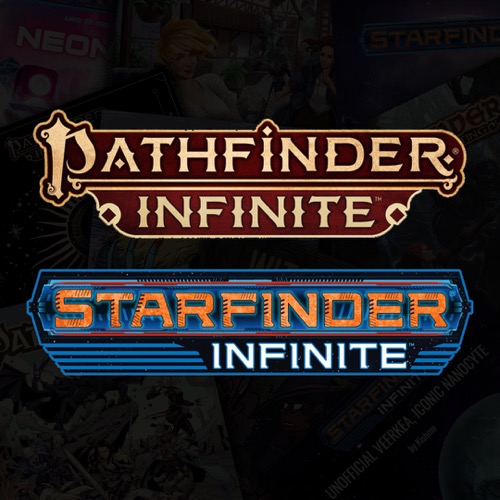Tomorrow, Paizo will release our first books using the Open RPG Creative license (ORC), which, like the OGL before it, will allow other publishers to use some of Paizo’s copyrighted material (specifically, rules expressions) in their own products. There are several extant licenses that allow other parties to use Paizo’s IP, including the OGL, Pathfinder/Starfinder Compatibility Licenses, and Paizo Community Use Policy. But today, I’d like to address some questions we’ve been receiving from creators releasing content under the Community Content Agreement for Pathfinder Infinite and Starfinder Infinite, on those respective marketplaces. Specifically, I want to answer everyone’s burning question, from the newly updated Infinite FAQ:
How does Pathfinder Infinite interact with the Open RPG Creative License (ORC)?
The Open RPG Creative License and Pathfinder Infinite are two distinct and separate things that allow you to use rules and IP owned by others.
The ORC allows publishers to use material designated as Licensed Material in ORC-licensed Paizo publications in their own ORC publications. This is restricted to only Licensed Material, which is nearly always copyrighted expressions of game mechanics. While Paizo now releases game rules under the ORC, the Community Content Agreement for Pathfinder Infinite and Starfinder Infinite already grants you the right to use this same content and more. As such, you do not need to cite the ORC when using any Paizo-owned material that was otherwise released under the ORC.
This means that you can already use anything Paizo owns under the terms of the Infinite License, including game rules. Thus, you don’t need the ORC to be able to publish derivative material on Pathfinder Infinite.
In fact, as of the publication of this FAQ, you are expressly prohibited from releasing any content in your Pathfinder Infinite or Starfinder Infinite product as Licensed Material under the ORC.
This ensures that what you release on Pathfinder Infinite or Starfinder Infinite remains within this closed ecosystem, as required by the Infinite license. It also ensures that you or another Infinite publisher don’t inadvertently release something you or Paizo don’t own, that wasn’t previously ORC-Licensed Material (like OGL-based Open Game Content) under the ORC license. Doing so would put you in violation of the OGL, which doesn’t allow Open Game Content to be released under a secondary license.
This also means that you can’t use any ORC Licensed Material that didn’t originate in a Paizo publication, as the Infinite License doesn’t grant you the rights to that material, and you can’t comply with the ORC by passing that open content through to downstream users.
This is a lot of FAQ text to say, basically, that the Infinite license already does what you want the ORC to do when making products for Pathfinder Infinite. By ensuring products released on Infinite are subject to only a single license (the Community Content Agreement for Pathfinder Infinite and Starfinder Infinite), we actually make a cleaner process for everyone, because it means that you don’t have one license telling you that you need to make all your game rules open for anyone to use anywhere, and another telling you that what you release on Pathfinder Infinite needs to stay on Pathfinder Infinite.
For publishers looking to release content based on or supporting the Pathfinder Player Core and/or Pathfinder GM Core, this doesn’t really change anything for you. Paizo has already ensured that there’s nothing in those books that would require you to use a secondary license like the OGL or ORC to reprint or iterate on their content; it’s all 100% created by and owned by Paizo, so the Infinite license already lets you do whatever you want with it.
For publishers who had hoped to make ORC conversions of OGL content, I’m afraid you’re not going to be able to do so. But technically neither the OGL nor the ORC nor the Infinite license allow you to do that anyway! At this time, we are not restricting the use of the OGL or inclusion of Open Game Content in Infinite releases, because we still have classes and monsters and other game and setting elements that creators will need access to in order to make content for Pathfinder. You just can’t cross the streams, and you’re required to adhere to all the rules of the OGL, as normal.
We understand that there are going to be a lot of questions about this policy, and because IP law is complicated and hard to put into text, I’ll be hosting a Twitch stream next Tuesday, November 21, at 11:00 a.m. Pacific Standard Time (PST)—with Meredith from DriveThruRPG—to answer any questions we receive in the comments below or via other channels. This will be a live stream, but not a live Q&A, so if you have questions, please ask beforehand. I’ll do my best to clear things up in comments, but for frequent or complex questions, you may have to wait a week.
In the meantime, we’ve updated the FAQ for both Pathfinder and Starfinder Infinite with this policy as well as some clarification on older questions, and a few other news ones. Check that out here.
We are excited about Pathfinder Infinite’s future, and how the Pathfinder Second Edition Remaster Project is already a vitalizing force in the community, and we want to make sure everyone has the tools they need to participate and help Pathfinder, Pathfinder Infinite, and their own products reach their full potential.
Mark Moreland
Director of Brand Strategy
Pathfinder Infinite and the ORC License
Tuesday, November 14, 2023











